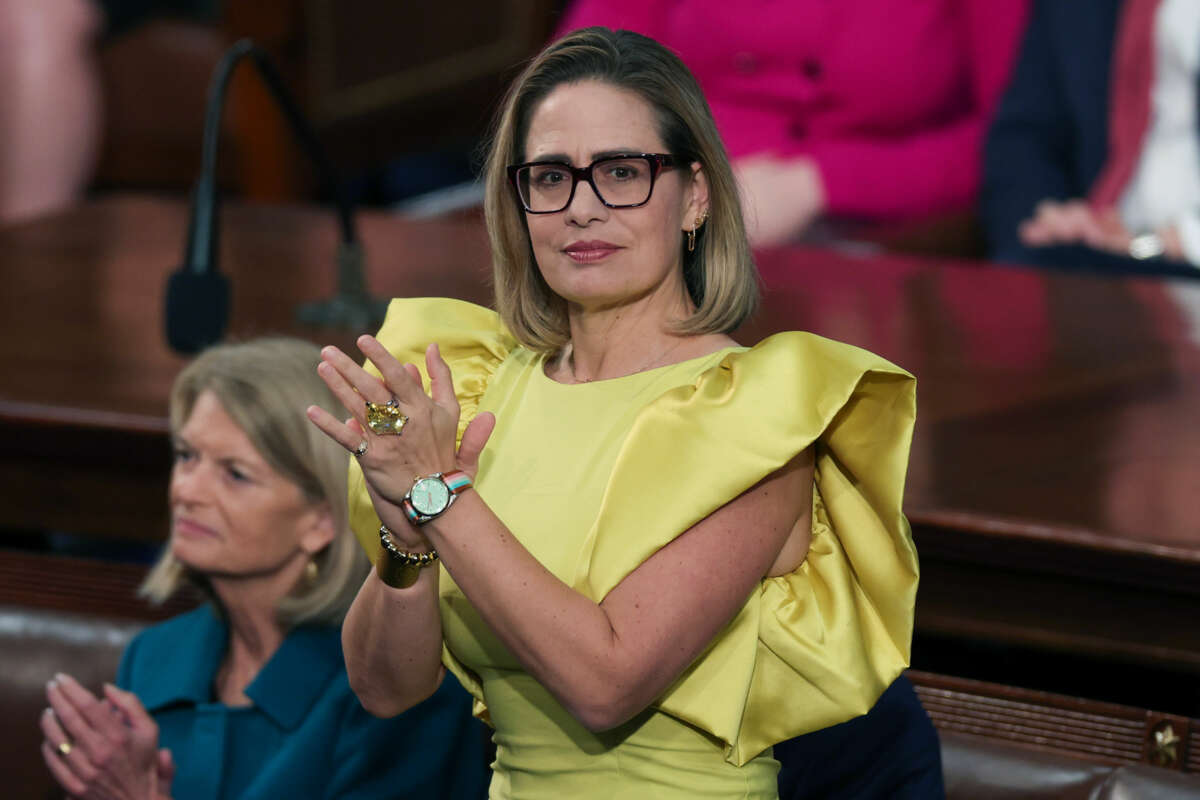Did you know that Truthout is a nonprofit and independently funded by readers like you? If you value what we do, please support our work with a donation.
Democratic Arizona Congressman Ruben Gallego on Tuesday accused Sen. Kyrsten Sinema — who he hopes to oust from the U.S. Senate next year — of playing a major role in the Silicon Valley Bank collapse by taking campaign contributions from lobbyists that represented the bank and then voting to deregulate it.
Politico reports that Sinema (I-Ariz.) was one of numerous members of Congress to take campaign donations from Franklin Square Group, which once counted Silicon Valley Bank (SVB) among its clients. In 2018, Sinema — then a Democrat serving in the U.S. House of Representatives — received more than $8,000 from the lobbyists before she voted for Sen. Mike Crapo’s (R-Idaho) Economic Growth, Regulatory Relief, and Consumer Protection Act.
“Before voting to loosen bank safeguards, Sinema received over $100,000 from big banks. And among those who bought Sinema’s vote were three Silicon Valley Bank lobbyists that maxed out,” Gallego said in a campaign email. “Simply put, she voted to give the banks free rein. And I did not.”
“The SVB collapse is a direct result of Kyrsten Sinema’s choice to side with big banks over everyday Arizonans.”
Dubbed the Bank Lobbyist Act by critics, the law rolled back the Dodd-Frank Act — which was passed in the wake of the 2007-08 global financial meltdown — and exempted banks with between $50 billion and $250 billion in assets from rigorous stress-testing and capital requirements. Both SVB and Signature Bank, which are both now under federal government control, qualified for the “medium-sized bank” exemption.
Sinema argued at the time that “these important reforms will help protect the financial security of Arizonans young and old as they plan for homeownership, a college education, or a stable retirement.”
Gallego asked Monday: “What’s the difference between Sen. Sinema and me? When bank lobbyists asked me to weaken bank regulations, I said no. When they asked Sen. Sinema, she asked how much — and voted yes. Now we are all going to pay for her mistake.”
On Twitter Tuesday, Gallego wrote that “the SVB collapse is a direct result of Kyrsten Sinema’s choice to side with big banks over everyday Arizonans.”
“FEC records and public lobbying reports show that three SVB lobbyists maxed out donations to Sinema ahead of 2018 Dodd-Frank rollback which led to the collapse,” Gallego continued, referring to the Federal Election Commission. “Sinema is in the pocket of Wall Street and her vote put hardworking Arizonans, their families, and their small business, at risk of another 2008-like meltdown.”
“Arizonans deserve a leader in the Senate who will fight for them, not Wall Street,” he added. “Sinema is not that person and Arizonans know it.”
Sinema was far from alone in taking campaign cash from SVB’s lobbyists and political action committee.
As Politico’s Hailey Fuchs, Jessica Piper, and Holly Otterbein noted:
Between 2017 and 2022, Silicon Valley Bank’s PAC gave more than $50,000 to the campaigns of nearly two dozen senators and representatives, according to filings with the Federal Election Commission. The donations largely went to members — Republicans and Democrats — who served on relevant committees including the House Financial Services Committee or Senate Finance Committee. Sen. Mark Warner (D-Va.) and Rep. Patrick McHenry (R-N.C.) received the most from the PAC, each bringing in $7,500 over the six-year period.
SVB CEO Greg Becker “also made maximum individual donations to the campaigns of Warner and Senate Majority Leader Chuck Schumer (D-N.Y.) during the 2022 cycle,” the reporters added, citing FEC records.
Sinema — who has been accused of “cartoonish-level corruption” for coziness with corporations and lobbyists — was excoriated in a Tuesday Daily Beast article by Michael Daly, who called the senator “a wolf for Wall Street.”
Daly took aim at Sinema’s Sunday statement asserting that “the federal government must now ensure those responsible [for the SVB collapse] are held accountable, while maintaining stability for all Americans who rely on our banking system.”
“Sinema need only step in front of a mirror to find a prime suspect,” wrote Daly. “Whether she’s calling herself a Democrat or an independent, her voting record is the same. And it marks her a shill for the banking industry.”
A terrifying moment. We appeal for your support.
In the last weeks, we have witnessed an authoritarian assault on communities in Minnesota and across the nation.
The need for truthful, grassroots reporting is urgent at this cataclysmic historical moment. Yet, Trump-aligned billionaires and other allies have taken over many legacy media outlets — the culmination of a decades-long campaign to place control of the narrative into the hands of the political right.
We refuse to let Trump’s blatant propaganda machine go unchecked. Untethered to corporate ownership or advertisers, Truthout remains fearless in our reporting and our determination to use journalism as a tool for justice.
But we need your help just to fund our basic expenses. Over 80 percent of Truthout’s funding comes from small individual donations from our community of readers, and over a third of our total budget is supported by recurring monthly donors.
Truthout has launched a fundraiser to add 500 new monthly donors in the next 9 days. Whether you can make a small monthly donation or a larger one-time gift, Truthout only works with your support.
